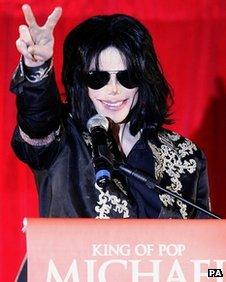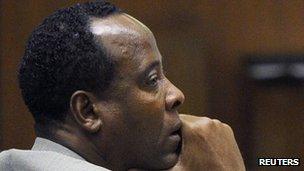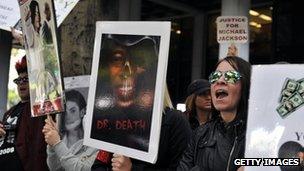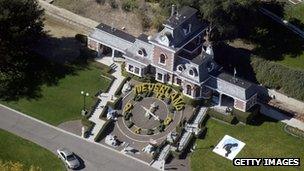Michael Jackson: The trial of Dr Conrad Murray
- Published

Michael Jackson died in June 2009
Michael Jackson was in good spirits. With less than three weeks to go before the start of a series of comeback concerts at London's O2 arena even he, the ultimate perfectionist, had to admit things were looking good.
After viewing the video clips that would accompany such classic hits as Billie Jean and She's Out of My Life, Jackson had led the company in their first dress rehearsal of Thriller.
When it was over he hugged the dancers and thanked the crew. Several of those who were present that night at the Los Angeles Staples Center said he was grinning from ear to ear.
It was a little after one o'clock in the morning by the time Jackson returned to the French chateau-style mansion he had been renting on the outskirts of Beverly Hills.
Waiting for him in his bedroom on the first floor was Conrad Murray. Tall and softly-spoken, Dr Murray had grown up on the Caribbean island of Grenada and like his father, who was also a doctor, moved to America in the hope of making a better life for himself.
He had been introduced to Michael Jackson three years previously by a patient who had worked for Jackson. On the night in question Dr Murray had served as the singer's personal physician for barely two months.
Nevertheless, he was familiar with the routine.
Once Michael Jackson had emerged from the shower Dr Murray applied cream to his back to treat a pigmentation disorder known as vitiligo and the two men then settled into the more challenging aspect of their nightly ritual: getting Jackson to sleep.
Experience had taught Dr Murray that this could be a prolonged routine. On this occasion it was to last until well after sunrise.
Swarming with reporters
Fast forward to a little after noon on the same day and the calm of the eight-bedroom mansion was shattered by the sound of shouting from Jackson's bedroom - followed a few minutes later by the sound of people racing up the stairs.
Paramedics responding to a call about a 50-year-old man suffering cardiac arrest found Michael Jackson sprawled across the floor in his pyjamas with a surgical cap on his head.
Oxygen tanks littered the doorway; a child-sized porcelain doll lay on the bed.
The heating was on - despite the fact that this was the middle of summer - and sweat was pouring down Dr Murray's face as he attempted mouth-to-mouth resuscitation.

Dr Murray has admitted to administering propofol to Jackson in his bedroom
But one look at Jackson's limp, lifeless body told the paramedics there was nothing they could do. His pupils were already dilated and his skin cold to the touch.
The faux French chateau, which Michael Jackson had been renting in LA - for a reported $100,000 (£62,000) a month - had seen some illustrious neighbours.
Barbra Streisand, Frank Sinatra, Mick Jagger and Cher had all called the same street home. But the fact that Jackson's all-time idol Elvis Presley had once lived just around the corner may ultimately have been what persuaded him to move there.
Minutes after the news broke of Jackson's death that same street - a stone's throw from Sunset Boulevard - was swarming with reporters.
News helicopters hovered overhead, satellite trucks jammed the side streets.
It had been more than four years since I - or any other journalist present that day - had last seen Jackson. That was in the town of Santa Maria, in the heart of California wine country, following his acquittal on charges of child sex abuse in 2005.
Elusive sleep
Covering that trial every day for nearly four months I was struck by the effect the proceedings seemed to have on Jackson's wellbeing.
We all remember the pictures of him shuffling into court in his pyjamas but there were times when he almost seemed to be withering away in front of our very eyes as details of his unorthodox lifestyle were dished up for the world to see.
Jackson considered the charges against him outrageous and the documentary which prompted them a "betrayal".
Although the verdict went in his favour, there was little doubt in my mind that he left Santa Maria a broken man.
Unsurprisingly perhaps, friends say it was around the time of that court case that Jackson started finding it increasingly difficult to get to sleep.
He had suffered from a variety of ailments over the years but none compared to the torment he endured once the lights went out.
"I once said Michael would have paid a $1m for a good night's sleep and though I was being somewhat facetious, in many ways it was true," Jackson's biographer J Randy Taraborrelli told the BBC.

Fans of Jackson have waited outside the Los Angeles courthouse throughout the six-week long trial
"When stressed out he couldn't sleep. Michael told me once that when he went to bed he couldn't stop the creative process.
"He was always creating, imagining, wondering how things would work out and what he could do to make them better. 'I can't turn it off' was how he put it to me. 'I wish I could. But I can't'."
Meaning that the more he needed it, the more elusive sleep became.
Shadowy entourage
Hence the decision to go "doctor shopping" in a quest to find someone who would prescribe the one substance he knew could save him from sleeplessness.
Dr Conrad Murray told detectives he first became aware of propofol after he allowed another doctor to treat Jackson at his surgery in Las Vegas.
Jackson slept soundly and when he awoke the two men discussed the possibility of Murray accompanying Michael Jackson to London.
Dr Murray, who throughout that interview referred to Jackson as a "friend", initially asked for $5m.
When the tour promoters, who were footing the bill on the Jackson's behalf, baulked at that price he agreed to lower it to $150,000 a month.
Those who knew Michael Jackson well all seem to agree on one thing.
Gifted though he was as an entertainer - and, at times, as a businessman - as a judge of character his skills frequently left something to be desired.
Jackson's sister La Toya referred to the "shadowy entourage" of handlers who frequently attached themselves to him like barnacles to a ship.

Michael Jackson's previous Los Angeles home Neverland
Over the years there was a virtual "revolving door" of assistants and advisors, many of whom seemed to bring a lot less to the table than they took from it.
"Michael put his trust in a lot of people over the years," said Mr Taraborrelli.
"He always gave people the benefit of the doubt. He would wait until a person proved him wrong before that person would be ousted from his life. [In some cases] he waited too long."
Neverland
The tragedy of this tale is that it could all have ended so very differently.
Once the concerts at London's O2 arena had come to an end Michael Jackson was planning to take the show on a worldwide tour and use the proceeds to build a hospital for disadvantaged children, headed - you've guessed it - by Dr Conrad Murray.
He also intended to spend more time with his three children - Paris, Prince and Prince Michael II, known as Blanket - whom he was raising alone.
The mansion he once occupied may also have changed hands effortlessly had he survived.
Yet with Neverland long-since closed and Jackson's grave off-limits to anyone other than family and friends, it has become - by default - a focal point for fans desperate for a link to their hero, no matter how macabre that link may be.
Which almost certainly was not what the owner - the head of the Ed Hardy fashion chain - had in mind when he bought the place.
He has made two attempts to sell it since Michael Jackson died but has yet to attract a buyer.
- Published4 November 2011